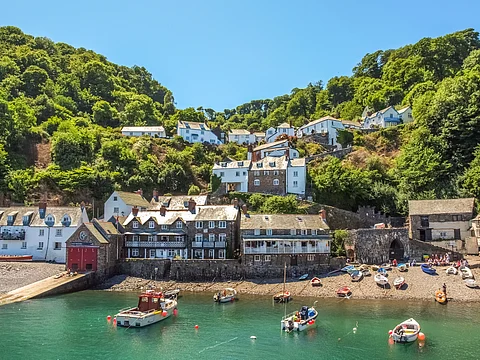
- Destinations
- Experiences
- Stay
- What's new
- Celebrating People
- Responsible Tourism
- CampaignsCampaigns
- SubscribeSubscribe
- Buy Now

As I traversed the cobbled walk that runs through the village's steep lanes of white-washed cottages down to Clovelly's harbour, 120m below, I was enveloped in a sense of timelessness. Tucked away along the rugged coast of Devon in South West England, offering stunning views of Bideford Bay, the hidden gem whispered tales of centuries past. As an Indian traveller navigating the intricate tapestry of the United Kingdom, I find it easy to overlook Clovelly. Yet, beneath its unassuming exterior, this privately owned harbour village has a rich history woven intricately into England's narrative.
In the 11th century, Clovelly was listed in the venerable Domesday Book, England's earliest public record. Originally, it was owned by William the Conqueror, King of England. The ownership then passed from the monarch to the queen—Matilda of Flanders, England's first crowned queen and wife to the Conqueror. The harbour village had many royal associations until 1242 the Giffard family acquired it. Today, the mantle of stewardship has shifted to the Hon. John Rous, great grand-nephew of Christine Hamlyn, who assumed ownership of the estate in 1884, ensuring that Clovelly's legacy endures through the ages.
"To become a resident of this idyllic enclave is no simple task. Prospective inhabitants must navigate a rigorous application and interview process," explained Mark Lakeman, my Experience South West Tours guide. "This is to ensure that Clovelly's cherished community remains a haven for those who value its unique charm and heritage," added Sally Everton of Visit Devon.
Soon, I was eating lunch with Hon. John Rous at a restaurant in The Red Lion Hotel, an 18th-century harbourside inn with 17 beautifully decorated rooms boasting a sea view. We indulged in Clovelly's storied history. Clovelly's allure excelled mere aesthetics. It served as a wellspring of inspiration for luminaries across the ages. From the esteemed pen of Charles Kingsley to the immortal prose of Charles Dickens and the evocative brushstrokes of J.M.W. Turner, it captivated the hearts and minds of artists throughout history.
For Kingsley, Clovelly held a deeply personal significance as it was here that he spent his formative years. No wonder the village devoted a small museum to the writer, a must-visit place in Clovelly. Dickens, too, was entranced by its allure, weaving its enchanting vistas into the fabric of his tales. Turner immortalised Clovelly's ethereal landscapes upon his canvases, ensuring their splendour would endure for generations.
Stepping into Clovelly felt like navigating a portal to another era. Here, amidst the timeless beauty of nature's canvas, modernity took a backseat. I was not only enthralled to see any cars, chain stores, or the cacophony of traffic noises disturb the tranquillity but felt great pleasure to be accompanied by the soothing soundtrack of the rhythmic lapping of waves against the 14th-century stone quay. Intrigued by the life in Clovelly, I visited the Fisherman's cottage, which showed how fisherman's families lived here in the 1930s. The cottage can be found walking along the path by the side of the Kingsley Museum.
Another object that I found fascinating was the humble sledge parked outside each cottage. It served as a faithful companion to aid residents in ferrying their purchases homeward, a quaint reminder of simpler times. At first, this seemed out of place. But when I looked closely at history, I saw that the sledges largely replaced donkeys by the 1970s, and this is the way the community adapted to modern times while still preserving the past. The village still has resident donkeys, and children can enjoy rides in the summer.
In the heart of Clovelly, amidst the ebb and flow of life's ceaseless tide, I found myself humbled by the sheer weight of history and natural beauty that permeate every corner of this enchanting village. I was reminded that Clovelly is not merely a place but a living and breathing testament to the enduring spirit of England's past, present, and future.
As I bid farewell to Clovelly, its memory etched indelibly upon my soul. I carried the echoes of its timeless charm, a beacon of hope in an ever-changing world. It will forever hold a special place in my heart, a sanctuary of serenity amidst the tumult of life's journey.
Getting There: To get to Clovelly, you can take several routes: by road, it's just off the A39, 16 kilometres west of Bideford, with the nearest motorway exit being Junction 27 of the M5. If you prefer public transportation, Barnstaple is the nearest train station, with bus services available from both Barnstaple and Bideford. For air travel, Exeter Airport is the closest option.
Timing: Clovelly is typically open from 9:00 a.m. to 5:00 p.m. throughout the year, except on Christmas Day. However, it is a good idea to verify the opening hours, especially during the winter months, by contacting The Visitor Centre.
Ticket: Clovelly's Visitor Centre requires an entrance fee. This fee includes parking, access to the Kingsley Museum, Fisherman's Cottage, Clovelly Court Gardens, and a 20-minute film detailing the captivating history of Clovelly. Additionally, The Visitor Centre features amenities such as a café and souvenir shops. Admission prices are INR 950 for adults and INR 550 for children aged 7-16, though prices may fluctuate depending on the season.
Clovelly Court Gardens and Church: Clovelly Court, the ancient manor house of the estate with a classic Victorian walled kitchen garden and the parish church of all Saints dating back to the 13th century is worth a visit.
Mouthmill Cove Walk: It starts at the top of Clovelly's cobbled street. The coastal path to Mouthmill Cove passes through hay meadows and shady woodlands, opening to spectacular cliff-top views. When you reach the secluded private cove, you can relax on the beach and explore rock pools.
